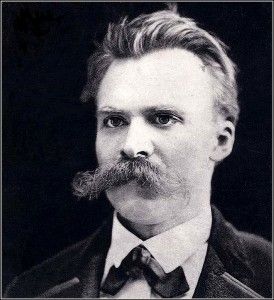De Lubac and Nietzsche

"God is dead." Anyone who graduated eighth grade has heard that famous Nietzsche pronouncement. It makes Christians cringe, but Nietzsche meant nothing by it. He was merely pronouncing what the rest of Western civilization had impliedly concluded. He needed to slam shut the book on Christianity so he could make it clear that, now that God was dead, Western civilization was officially screwed (subject to some vague hope in the Superman, a concept I've never fully understood . . . and I'm not sure Nietzsche did). Neither science nor humanism would save civilization, and Nietzsche wanted to make sure that those people who cheered God's death fully appreciated what they had unleashed.
Nietzsche wants to shake [the atheist scoffers] out of their complacency; he wants to make them perceive the void which has been hollowed out within them, and he accosts them in violent terms. Henri de Lubac, The Drama of Atheist Humanism.
Nassim Taleb made similar observations in Antifragile.
[Nietzsche] went after Socrates, whom he called the 'mystagogue of science,' for 'making existence appear comprehensible.' . . . 'What is not intelligible to me is not necessarily unintelligent. Perhaps there is a realm of wisdom from which the logician is exiled?' . . . It is the very goodness of knowledge that [Nietzsche] questioned.
De Lubac, incidentally, completely agrees with Taleb on this point. Nietzsche didn't hate Socrates because of Socrates' moralism, but because of Socrates' rationalism and the insufficient respect Socrates gave to mysticism and myth. "But man," notes de Lubac, citing Nietzsche, "starved of myths is a man without roots. He is a man who is 'perpetually hungry,' an 'abstract' man, devitalised by the ebbing of the sap in him."
